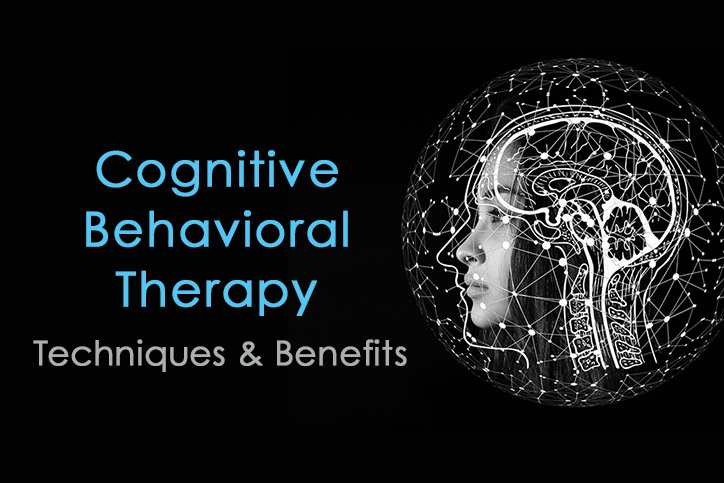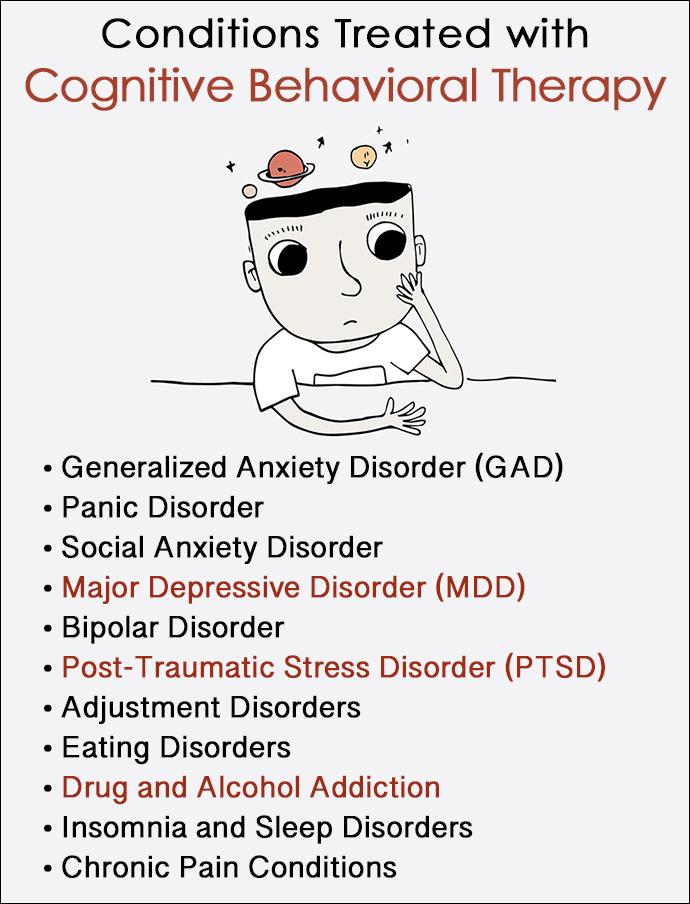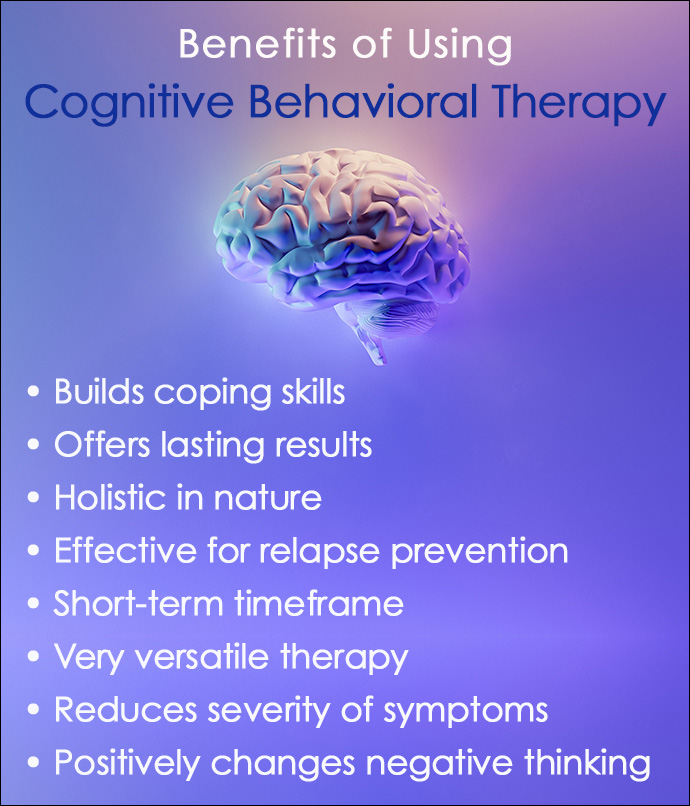Table of Contents
Cognitive Behavioral Therapy techniques and benefits make CBT an extremely effective therapeutic approach that offers practical tools and strategies for overcoming a wide range mental health issues and substance use addiction.
Stress, anxiety, and trauma are common in today’s fast-paced world and if left untreated they can lead to more serious conditions that may spiral out of control.
Cognitive Behavioral Therapy techniques and tools are designed to address and modify negative thought patterns to provide lasting mental wellness.
What is Cognitive Behavioral Therapy (CBT)?
Cognitive Behavioral Therapy (CBT) is an evidence-based, goal-oriented psychotherapy that identifies and addresses the connection between a person’s thoughts, feelings, emotions, and behaviors.
It is a form of talk therapy that is based on the premise that our thoughts, feelings, and behaviors are all connected.
CBT was developed by Dr. Aaron Beck in the 1960s as an approach to mainly treat depression and today it is one of the most widely used treatment modalities around the world for managing a variety of mental health conditions.
Cognitive Behavioral Therapy empowers individuals to have a better understanding of their thought processes, change dysfunctional behaviors, and develop effective coping strategies to improve mental well-being.
Core Principles of CBT
1. Evidence-Based
Cognitive Behavioral Therapy is supported by a substantial body of research and is considered an evidence based treatment that is effective for use with many types of mental health conditions including addiction.
2. Collaborative and Structured
CBT is a collaborative therapy between a therapist and the client patient that follows a structured format to identify specific goals and practical strategies to achieve them.
3. Time-limited
CBT is typically a short-term therapy that encourages a focused approach to setting and achieving the patient’s goals and objectives.
3. Focused on the Present
While past experiences may have an impact on a person’s thinking, CBT therapy primarily focuses on the present moment to help individuals understand how their current thoughts and behaviors contribute to emotional challenges and deal with them in the here and now.
4. Cognitive Restructuring
CBT Therapy helps individuals become aware of their automatic negative thoughts and uses cognitive restructuring to learn how to challenge and replace unrealistic thoughts with more realistic ones.
5. Behavioral Modification
Behavioral Modification focuses on behaviors linked to emotional distress and uses strategies to change the negative behaviors and promote positive and healthier actions.
6. Skill-Building
CBT develops positive coping skills that individuals can use for relaxation, problem-solving, and reducing stress.
7. Versatile
CBT is a very versatile therapy that is effective for a wide variety of mental health issues, including anxiety, depression, trauma, eating disorders, drug and alcohol addiction, and many others.
What Conditions are Treated with Cognitive Behavioral Therapy?
Because of its versatility, CBT Therapy is recommended for many types of mental health conditions and substance use disorders.
CBT Therapy is effective for treating the following conditions:
- Generalized Anxiety Disorder (GAD)
- Panic Disorder
- Social Anxiety Disorder
- Major Depressive Disorder (MDD)
- Bipolar Disorder
- Post-Traumatic Stress Disorder (PTSD)
- Adjustment Disorders
- Eating Disorders
- Drug and Alcohol Addiction
- Insomnia and Sleep Disorders
- Chronic Pain Conditions
Benefits of Cognitive Behavioral Therapy
Cognitive Behavioral Therapy (CBT) offers many benefits for individuals struggling with mental health challenges and substance use disorders.
It is one of the most extensively researched forms of evidence-based psychotherapy and works well with a number of different treatment modalities to provide a comprehensive method of achieving mental-wellness.
The Benefits of CBT Therapy Include:
1. Builds coping skills
CBT equips individuals with practical coping skills and tools to independently overcome negative thoughts, emotions, and behaviors. It teaches healthy ways of coping with stress and negative emotions to improve resilience and overall well-being.
2. Offers lasting results
CBT teaches skills and techniques that individuals can continue to use in daily life long after treatment sessions with a therapist have concluded.
3. Holistic in nature
Cognitive Behavioral Therapy uses a holistic approach to healing by addressing the connection between a person’s thoughts, emotions, and behavior, and contributes to a better understanding of their overall mental health.
4. Effective for relapse prevention
CBT provides individuals with the tools for recognizing potential triggers or warning signs and teaches strategies for managing relapse prevention. This makes it an effective therapy for preventing the recurrence of symptoms in the future.
5. Short-term timeframe
CBT is often a short-term therapy that is goal-oriented, with a focus on achieving specific objectives and outcomes in a relatively brief period.
6. Very versatile
Cognitive Behavioral Therapy is ideal for a wide range of mental health conditions, and because many of them overlap with each other, it can used for more than one condition. It can be adapted for depression, anxiety disorders, phobias, OCD, eating disorders, and substance use disorders.
7. Reduces severity of symptoms
Many patients notice the severity of symptoms associated with their mental health condition is reduced in a fairly short time, which makes it easier to move forward in recovery. Reducing the severity of symptoms can accelerate improvements in mood, stress, anxiety, and overall mental functioning.
8. Positively changes negative thinking
Identifying and modifying negative thought patterns leads to healthier and more realistic thinking, which has a positive impact on emotions, behaviors, and healing.
Many Cognitive Behavioral Therapy benefits provide individuals with practical tools to better understand the causes and reasons for their mental health challenges and offer effective strategies that lead to positive changes with lasting results.
Cognitive Behavioral Therapy Techniques
There are many different types of Cognitive Behavioral Therapy techniques and strategies that can be applied to various conditions or challenges.
Here is a Sampling of Effective Cognitive Behavioral Therapy Techniques
1. Cognitive Restructuring
With cognitive restructuring, clients learn to identify and recognize distorted or negative thought patterns. The role of the therapist is to guide individuals to challenge irrational thoughts and replace them with healthier and more realistic ones.
2. Behavioral Activation
Behavioral activation encourages clients to engage in positive and fulfilling activities to correct or neutralize unhealthy thoughts and behaviors. Gradual exposure targets avoidance behaviors by consciously confronting problematic situations.
3. Mindfulness and Relaxation Techniques
Mindful breathing is a CBT technique that teaches individuals to focus on their breath in the present moment to reduce stress and anxiety. It is useful for reducing stress and anxiety and improves focus and attention.
4. Journaling
Journaling allows individuals to record negative thoughts and emotions, as well as positive, healthier ones. Keeping a Gratitude Journal is a way to express gratitude and appreciate positive daily experiences.
5. Role-Playing
Social skills training is a method to help individuals develop and enhance their own interpersonal skills through role-playing scenarios and acting out different situations to reframe automatic negative thoughts.
Types of Cognitive Behavioral Therapy
Cognitive Behavioral Therapy is a versatile form of therapy, and distinct types of CBT have been developed to address specific mental health issues and conditions.
Here are some notable types of Cognitive Behavioral Therapy
Dialectical Behavior Therapy (DBT)
Dialectical Behavior Therapy was originally developed for treating borderline personality disorder and has broadened its scope as a complement to CBT Therapy by integrating acceptance and mindfulness techniques.
Cognitive Processing Therapy (CPT)
Cognitive Processing Therapy is a specific type of CBT designed for treating post-traumatic stress disorder (PTSD). It combines cognitive restructuring with exposure techniques to help individuals address negative beliefs related to traumatic experiences.
Mindfulness-Based Cognitive Therapy (MBCT)
Mindfulness-Based Cognitive Therapy combines mindfulness practices with CBT to prevent the relapse of depression by teaching people how to become more aware of their thoughts and feelings without judging them.
Acceptance and Commitment Therapy (ACT)
Acceptance and Commitment Therapy focuses on accepting negative thoughts and feelings instead of trying to change or eliminate them by encouraging individuals to commit to behaviors and actions that align with their values.
Exposure and Response Prevention (ERP)
Exposure and Response Prevention is a specialized form of CBT for treating obsessive-compulsive disorder (OCD) and help individuals break the cycle of obsessions and compulsions.
Trauma-Focused Cognitive Behavioral Therapy (TF-CBT)
Trauma-Focused Cognitive Behavioral Therapy combines cognitive behavioral therapy techniques with trauma-focused interventions that address the impact of traumatic events experienced by children and adolescents.
Cognitive Behavioral Analysis System of Psychotherapy (CBASP)
CBASP was developed as a therapy for addressing interpersonal challenges faced by individuals with chronic or persistent depression.
Brief Cognitive Behavioral Therapy (BCBT)
Brief Cognitive Behavioral Therapy is a condensed form of CBT that focuses on specific, targeted goals in a shorter timeframe than usual, while still offering the most important benefits of CBT.
These forms of CBT demonstrate the adaptability of this therapeutic approach for treating specific mental health conditions.
The Cognitive Behavioral Therapy techniques and benefits outlined here demonstrate how versatile this evidence-based approach can be for treating mental health issues and addiction.
CBT offers the tools and strategies to identify and address a person’s negative thoughts, feelings, emotions, and behaviors, and improve overall mental health and well-being.






